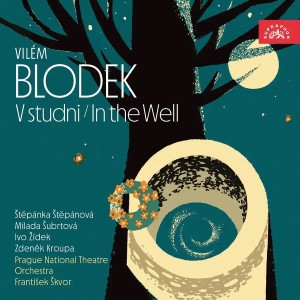
Vilém Blodek (1834-1874)
V studni (In the Well) (1867)
Štěpánka Štěpánová (contralto) – Veruna
Milada Šubrtová (soprano) – Lidunka
Ivo Žídek (tenor) – Vojtěch
Zdeněk Kroupa (bass) – Janek
Chorus and Orchestra of the Prague National Theatre/František Škvor
rec. March 1959, Domovina Studio, Prague
Libretto not included but available in Czech and English via Supraphon’s website
Supraphon SU4341-2 [71]
Supraphon first recorded complete operas in stereo in 1959 though they were only able to press them in mono until 1961-62, so Jaroslav Krombholc’s Káta Kabanová and Zdeněk Chalabala’s The Bartered Bride were released in mono and later reissued in stereo. Vilém Blodek’s one-act folk opera In the Well, recorded in March 1959,met a different fate. It was released in a limited edition in mono in 1960 and at the end of the decade was deleted from the catalogue, never to reappear. This is the first time it has been made available in stereo, and it also serves to mark the 150th anniversary of Blodek’s death and, coincidentally, the centenary of soprano Milada Šubrtová’s birth.
In the Well was the first through-composed Czech comic opera, pre-dating the early versions of The Bartered Bride which contained spoken dialogue. Its libretto was written by Karel Sabina, who also wrote for Smetana and indeed wrote the libretto for The Bartered Bride which was the other most popular Czech opera of the 1860s. In the Well is a work of tremendous brio, charm and fun brimming with comic incidents. Its subject matter is the folk myth that every Midsummer solstice, during magical nights, maidens could see their future husbands in the village pond. This was an old pan-Slavic myth revitalised for comic purposes by Sabina in which the lecherous, elderly Janek, a buffo bass, falls from a tree overlooking the well but, rather than getting his maiden, is subject to ribald mockery. An undercurrent of marriage, fertility and eroticism enlivens the story in which the young Vojtěch gets his maiden, Lidunka, and all ends well.
The stereo restoration has been accomplished with great skill and though I’ve never heard the mono LP inscription, and so can’t compare the two, the immediacy of the brass and percussion, to cite just two examples from the Overture, indicate the sonic richness to come. The full sound stage is exploited at various points and one can hear the spatial distances involved to the great advantage of the work’s theatrical intimacy – that’s especially true of the vocally distanced chorus (‘behind the stage’) towards the opera’s climax in scene 16. The four singers were leading interpreters of the time. Contralto Štěpánka Štěpánová, a fine rich stylist, is the oldest of the quartet and was in her early 50s, making her a plausible Wise Woman, Veruna. Her voice is characterful and easily distinguishable from the much younger Milada Šubrtová who is the youthfully refined Lidunka. Ivo Žídek is her ardent squire, and Zdeněk Kroupa is the figure of fun (mostly), Janek. These last three singers were contemporaries born between 1921 and 1926 and in fresh voice. There are no Slavic wobbles.
The opera has a rapid panorama of comic moments. The orchestral writing has Weber-like zest and animation, and there are examples of national music, such as the St John’s Eve scene, sung as an ensemble hymn for the central characters. Žídek gets the chance to demonstrate his passionate lyric tenor in the fourth scene, whilst Kroupa, a famous Forester in The Cunning Little Vixen, has plenty of opportunities for comic business. There is a pre-Mascagni orchestral Intermezzo, an interlude called ‘Moonrise’ which is a lovely cantilena with a well-balanced harp. It should really be better known, as should the opera as a whole. The choruses are charmingly voiced, boys and girls as well as the adult choruses. There is even some folk patter-singing from Janek that might amuse those who like The Pirates of Penzance (1879) and a riotous denouement which is splendidly enunciated by the Chorus of the Prague National Theatre. No comic opera should end without a hymn of praise and we duly get one, strongly rooted in Czech history and pageantry.
I’ve mentioned everyone but the conductor, František Škvor, who was born in 1898 in what’s now Croatia but was then Austria-Hungary. This was his only full-length operatic recording for Supraphon though he did record some Martinů and Swan Lake and was an accompanist on a few vocal recitals. He died in 1970. He directs with animation and with all-round theatrical control and I’ve no idea why his career on disc was so circumscribed, though as we know there were numerous Czech conductors at the time jostling for Supraphon’s shilling. Still, it would have been valuable to have heard him in a ‘big’ Czech work.
Given its unavailability listeners have had no choice but to turn to Jan Štych’s splendid 1981 recording with the same orchestra but with Pavel Kühn’s chorus and some fine soloists – Libuše Márová, Daniela Šounová, Vojtech Kocián and the veteran bass Karel Berman, a recording that also includes the fragment from Blodek’s Zítek.
If you want the libretto, and most of us will, I’m afraid that it’s not included. You’ll have to find it on Supraphon’s website or via the QR code. This is something of a pain.
However, this newly-minted stereo recording fits handily on one disc and reflects the high standards at the National Theatre and Supraphon’s care and enterprise in remastering this lovable example of Czech comic opera.
Jonathan Woolf
Buying this recording via a link below generates revenue for MWI, which helps the site remain free




















